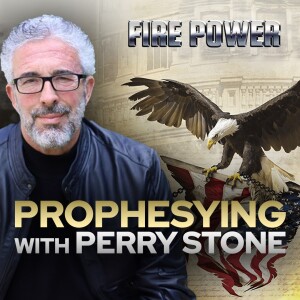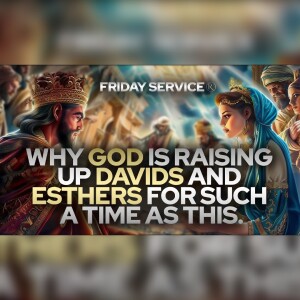Episodes

Wednesday Aug 28, 2024
Wednesday Aug 28, 2024
mario
🔥 HELP US DEFEAT CENSORSHIP! PLEASE SHARE THIS LIVE STREAM! 🔥
#toddcoconato #mariomurillo #firepower #perrystone
Tonight on Fire Power an urgent prophetic warning from special guest Perry Stone! You're going to regret missing one minute of this. It is astounding! Confirmation is the word you're going to hear, words that are going to blow your mind from a prophetic voice that's trusted in this hour!
https://toddcoconato.com/give
https://mariomurillo.org/

Wednesday Aug 28, 2024
Wednesday Aug 28, 2024
God Is with Us • Sunday Service
Website: www.PastorTodd.org
To Give: www.ToddCoconato.com/give
In this hour, as we witness the unfolding of events that echo the prophecies of old, we as believers must remain steadfast in our faith. The world is changing rapidly; many are grappling with uncertainty, fear, and confusion. However, the Word of God offers us profound encouragement and guidance for these last days. Our faith, which has always been the bedrock of our relationship with God, must be strengthened and refined as we approach the culmination of time. Let us delve into the Scriptures to gain wisdom and encouragement for these times, ensuring that our faith remains unwavering and our discernment keen.
1. Hebrews 11:1 (NKJV): "Now faith is the substance of things hoped for, the evidence of things not seen."
2. Matthew 24:12 (NKJV): "And because lawlessness will abound, the love of many will grow cold."
3. 2 Timothy 3:1-2 (NKJV): "But know this, that in the last days perilous times will come: For men will be lovers of themselves, lovers of money, boasters, proud, blasphemers, disobedient to parents, unthankful, unholy..."
4. 1 Peter 4:7 (NKJV): "But the end of all things is at hand; therefore be serious and watchful in your prayers."
5. James 1:6 (NKJV): "But let him ask in faith, with no doubting, for he who doubts is like a wave of the sea driven and tossed by the wind."
6. 2 Corinthians 5:7 (NKJV): "For we walk by faith, not by sight."
7. Revelation 3:10 (NKJV): "Because you have kept My command to persevere, I also will keep you from the hour of trial which shall come upon the whole world, to test those who dwell on the earth."
8. Ephesians 6:16 (NKJV): "Above all, taking the shield of faith with which you will be able to quench all the fiery darts of the wicked one."
9. Romans 8:18 (NKJV): "For I consider that the sufferings of this present time are not worthy to be compared with the glory which shall be revealed in us."
Beloved, as we journey through these last days, let us hold fast to our faith with unwavering conviction. Be discerning, watchful, and prayerful. Let us not be swayed by the growing lawlessness and moral decay around us but rather be shining examples of Christ’s love and righteousness. Embrace the promises of God and let your faith be a beacon of hope and strength. In every trial and challenge, remember that our faith is our greatest asset. It sustains us, protects us, and assures us of the glory that awaits. May we stand firm in our faith, wise in our discernment, and bold in our witness as we navigate these final days before the Lord’s return. Amen.

Friday Aug 23, 2024
Friday Aug 23, 2024
They Want Jezebel In The White House • The Todd Coconato Show
Website: www.PastorTodd.org
To Give: www.ToddCoconato.com/give
Are they trying to put a Jezebel in the white House? I know that's a crazy thought, but I believe they're actually trying to do that as we speak. We're going to get into the radio eco radical, leftist communist agenda of Kamala Harris. We're going to bring hard facts. Also in the UK, they tried to arrest a woman for praying! All that and so much more tonight on the Todd Coconato Show!

Thursday Aug 22, 2024
Thursday Aug 22, 2024
Don't Buy The Illusion • Fire Power!
#toddcoconato #mariomurillo #firepower #democrats #kamala #Illusion
We're going to prove to you that you can't believe anything that you're seeing right now that's coming out of the Democratic National Convention. We're going to prove it to you and give you some news that you really need to have. There is a massive illusion that's meant to cause confusion and delusion. But guess what? We have a solution!
👉👉 https://toddcoconato.com/give 👈👈
👉👉 https://mariomurillo.org/ 👈👈

Monday Aug 19, 2024
Monday Aug 19, 2024
Don't Believe The Illusion | The Todd Coconato Show
Website: www.PastorTodd.org
To give: www.ToddCoconato.com/give
"Don't Believe the Illusion" is a timely and crucial message for the hour in which we live. As we approach the return of Christ, the Bible clearly warns that deception will become more prevalent, with false teachings, ideologies, and spiritual experiences that can easily lead us astray if we are not grounded in the truth. This message serves as a call to arms for believers to be vigilant, discerning, and deeply rooted in the Word of God.
The importance of this sermon lies in the fact that we are constantly surrounded by illusions—temptations, false doctrines, and misleading narratives—that can seem true, good, or even righteous on the surface. However, without the wisdom and discernment that come from a solid foundation in Scripture and a close relationship with the Holy Spirit, we risk being led away from the path of righteousness.
Standing firm on the Word of God is the only way to safeguard our faith in these deceptive times. God's Word is the ultimate standard of truth, and it equips us to see through the lies and to test every spirit, every teaching, and every experience against His unchanging truth. By remaining steadfast in our commitment to Scripture, we protect ourselves from the seductive power of the enemy and ensure that we are walking in the light, not being misled into darkness.
This sermon emphasizes that our spiritual survival in these last days depends on our ability to discern the truth and reject the lies, holding fast to the Word of God as our anchor in a world filled with illusions.

Monday Aug 19, 2024
Monday Aug 19, 2024
General Mike Flynn Shares Thoughts On America | The Todd Coconato Show
Website: www.PastorTodd.org
To give: www.ToddCoconato.com/give
On today's Todd Coconato Show, we're diving into a recent, highly significant interview that General Michael Flynn gave on a program called Redacted. This conversation is one that every American needs to hear. General Flynn shares critical insights about the state of our nation and the challenges we face. It's not just another interview—it's a wake-up call that we cannot afford to ignore. Tune in to find out why this discussion is so important and what it means for us moving forward.

Sunday Aug 18, 2024
Sunday Aug 18, 2024
Chosen for Such a Time as This • Sunday Service
To Give: www.ToddCoconato.com/give
Website: www.PastorTodd.org
We often find ourselves in situations that challenge our strength, test our faith, and stretch our abilities. It is in these moments that we must remember that God has a purpose for each of us, and sometimes, we are placed in challenging circumstances to fulfill His divine plan. Today, we will explore the idea of being chosen for a particular challenge or "strike" in life, drawing inspiration from Scripture.
Scripture 1: Esther 4:14 (NKJV)
“For if you remain completely silent at this time, relief and deliverance will arise for the Jews from another place, but you and your father’s house will perish. Yet who knows whether you have come to the kingdom for such a time as this?”
Scripture 2: Jeremiah 1:5 (NKJV)
“Before I formed you in the womb I knew you; Before you were born I sanctified you; I ordained you a prophet to the nations.”
Scripture 3: Romans 8:28 (NKJV)**
“And we know that all things work together for good to those who love God, to those who are the called according to His purpose.”
Scripture 4: Philippians 4:13 (NKJV)
“I can do all things through Christ who strengthens me.”
Scripture 5: 2 Corinthians 12:9 (NKJV)
“And He said to me, ‘My grace is sufficient for you, for My strength is made perfect in weakness.’ Therefore most gladly I will rather boast in my infirmities, that the power of Christ may rest upon me.”
As we reflect on these scriptures, we are reminded that each of us has been chosen for a purpose. The challenges, or "strikes," we face are not without meaning. They are opportunities for us to step into the roles God has prepared for us, to rely on His strength, and to trust in His plan.
Just as Esther, Jeremiah, Paul, and others were called to their moments of challenge, so too are we called to face our circumstances with faith, courage, and the assurance that God is with us, working all things for our good.
Let us not shy away from the challenges before us but embrace them, knowing that we are chosen for such a strike as this. Amen.

Sunday Aug 18, 2024
Sunday Aug 18, 2024
Is This Their Next Move? • The Todd Coconato Show
To Give: www.ToddCoconato.com/give
Website: www.PastorTodd.org
On tonight's Todd Coconato show: Is This Their Next Move? What's going on in Afghanistan? What are average Americans saying about Kamala Harris? The discussionbetween Elon Musk and President Trump, Stephen Colbert and what happened on his show. You don't want to miss tonight's broadcast!

Sunday Aug 18, 2024
Sunday Aug 18, 2024
Why God is Raising Up Davids and Esthers for Such a Time as This? • Friday Service
To Give: www.ToddCoconato.com/give
Website: www.PastorTodd.org
We will delve into the stories of David and Esther—two remarkable figures in biblical history who were raised up by God for critical moments in their respective eras. Their decisions to embrace God's call shaped not only their destinies but the destinies of nations. As we go through their stories, I want us to reflect on why their obedience was crucial and how their lives serve as a prophetic mirror for us today. We are the modern-day Davids and Esthers, and the decisions we make now will have a profound impact on our families, communities, and the world.
Scripture 1: David's Anointing
1 Samuel 16:12-13 (NKJV):"So he sent and brought him in. Now he was ruddy, with bright eyes, and good-looking. And the Lord said, 'Arise, anoint him; for this is the one!' Then Samuel took the horn of oil and anointed him in the midst of his brothers; and the Spirit of the Lord came upon David from that day forward. So Samuel arose and went to Ramah."
Scripture 2: Esther’s Rise to Queenship
Esther 2:17 (NKJV):"The king loved Esther more than all the other women, and she obtained grace and favor in his sight more than all the virgins; so he set the royal crown upon her head and made her queen instead of Vashti."
Scripture 3: David and Goliath
1 Samuel 17:45-47 (NKJV):"Then David said to the Philistine, 'You come to me with a sword, with a spear, and with a javelin. But I come to you in the name of the Lord of hosts, the God of the armies of Israel, whom you have defied. This day the Lord will deliver you into my hand, and I will strike you and take your head from you. And this day I will give the carcasses of the camp of the Philistines to the birds of the air and the wild beasts of the earth, that all the earth may know that there is a God in Israel. Then all this assembly shall know that the Lord does not save with sword and spear; for the battle is the Lord’s, and He will give you into our hands.'"
Scripture 4: Esther’s Dilemma
Esther 4:13-14 (NKJV):"And Mordecai told them to answer Esther: 'Do not think in your heart that you will escape in the king’s palace any more than all the other Jews. For if you remain completely silent at this time, relief and deliverance will arise for the Jews from another place, but you and your father’s house will perish. Yet who knows whether you have come to the kingdom for such a time as this?'"
Scripture 5: David’s Leadership
2 Samuel 5:3-4 (NKJV):"Therefore all the elders of Israel came to the king at Hebron, and King David made a covenant with them at Hebron before the Lord. And they anointed David king over Israel. David was thirty years old when he began to reign, and he reigned forty years."
Scripture 6: Esther’s Boldness
Esther 5:1-2 (NKJV):"Now it happened on the third day that Esther put on her royal robes and stood in the inner court of the king’s palace, across from the king’s house, while the king sat on his royal throne in the royal house, facing the entrance of the house. So it was, when the king saw Queen Esther standing in the court, that she found favor in his sight, and the king held out to Esther the golden scepter that was in his hand. Then Esther went near and touched the top of the scepter."
Scripture 7: David’s Worship
2 Samuel 6:14-15 (NKJV):"Then David danced before the Lord with all his might; and David was wearing a linen ephod. So David and all the house of Israel brought up the ark of the Lord with shouting and with the sound of the trumpet."
Scripture 8: Esther’s Intercession
Esther 8:3 (NKJV):"Now Esther spoke again to the king, fell down at his feet, and implored him with tears to counteract the evil of Haman the Agagite, and the scheme which he had devised against the Jews."
Scripture 9: David’s Legacy
1 Kings 2:1-3 (NKJV):_"Now the days of David drew near that he should die, and he charged Solomon his son, saying: 'I go the way of all the earth; be strong, therefore, and prove yourself a man. And keep the charge of the Lord your God: to walk in His ways, to keep His statutes, His commandments, His judgments, and His testimonies, as it is written in the Law of Moses
1 Kings 2:1-3 (NKJV) Continued:"…that you may prosper in all that you do and wherever you turn."
Scripture 10: Esther's Victory and Legacy
Esther 9:1 (NKJV):"Now in the twelfth month, that is, the month of Adar, on the thirteenth day, the time came for the king’s command and his decree to be executed. On the day that the enemies of the Jews had hoped to overpower them, the opposite occurred, in that the Jews themselves overpowered those who hated them."
Conclusion: We Are Modern-Day Davids and Esthers
In the stories of David and Esther, we see individuals who were called by God for specific purposes in critical times. They were not perfect, but they were willing to say yes to God's call. Their obedience, faith, and courage changed the course of history.
We are the modern-day Davids and Esthers. The times we live in are marked by challenges and opportunities, and God is calling us to step into our divine assignments. Just as David faced giants and Esther faced a powerful enemy, we too face spiritual battles and cultural challenges. But God has equipped us with His Spirit, just as He did with David and Esther.
We need to understand that our obedience to God’s call is not just about our personal destinies; it’s about the destinies of those we are called to influence and lead. If Esther had not stepped up, her family would have perished, and the Jews could have been annihilated. If David had not faced Goliath, the Israelites might have been defeated. Our actions today can have far-reaching consequences.
God is raising up Davids—people after His own heart who will lead with integrity, worship Him wholeheartedly, and face the giants of our time with unwavering faith. God is raising up Esthers—men and women who will stand in the gap, intercede for their people, and use their influence to bring about justice and deliverance.
The call is urgent. We must take a stand now. Our world is in desperate need of leaders who are willing to say yes to God’s call, no matter the cost. Just as David and Esther were positioned for a specific time and purpose, we are positioned in this time for God’s divine purpose.
Let us, like David, be people after God’s own heart, and like Esther, be willing to take bold risks for the sake of others. When we align our lives with God’s will and step into our divine assignments, we will see His power at work in and through us, bringing about transformation and victory.
Let us pray.

Wednesday Aug 14, 2024
Wednesday Aug 14, 2024
100 Million Views Spells Trouble For Kamala • Fire Power!
#toddcoconato #mariomurillo #firepower #kamala #trump #trouble
Elon Musk sat down with Trump for an interview. Over 100 million views. Some say way more than that. That spells trouble for the legacy media and for Kamala, we'll explain why. We're going to talk about so many explosive topics. I don't know if, some of these sites are going to let it stay up, but share it!
👉👉 https://toddcoconato.com/give 👈👈
👉👉 https://mariomurillo.org/ 👈👈



